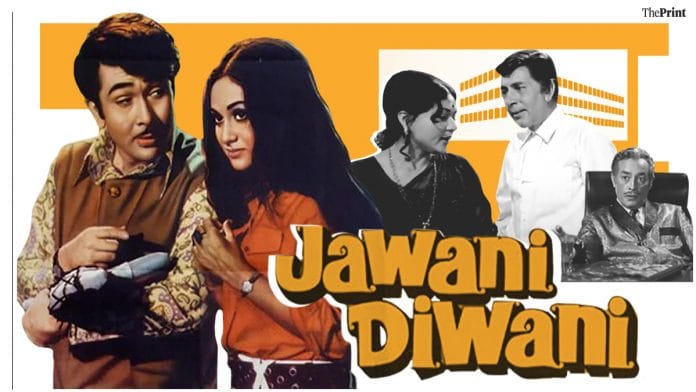When one thinks of the archetypal 1970s Bollywood rom com, one thinks of glamorous hairdos, shiny shirts, bell bottoms or tight kurtis, disco lights, young love and tunes that are still played at every sangeet and every house party.
Narendra Bedi’s Jawani Diwani (1972) certainly ticks most of these boxes, but it somehow manages, even within its candyfloss framework, to do a few things differently.
To begin with, there’s Jaya Bhaduri, who had been introduced to Hindi cinema’s audiences the previous year, after a few Bengali movies, as a sweet, slightly annoying schoolgirl in Guddi, and then a kind of extension of that in Uphaar. But Jawani Diwani changed her image, with big, puffy hair, bright shirts and flared pants, sunglasses and a properly flirty vibe.
Then there’s Nirupa Roy, who had been playing weepy mother to the lead for almost 20 years (her first one was in 1955’s Munimji, in which Dev Anand, who was seven years younger than her, played her son). Jawani Diwani is a departure for her, too, because while she does play a mother, it’s a young mother, to a young school-going son. She isn’t even very weepy, in fact, in a few scenes, she, too, positively flirts with her husband (Balraj Sahni).
And then there is Balraj Sahni. We know him mostly for his roles in socially conscious classics like Kabuliwala, Garm Hava and Do Bigha Zamin, and he would not be the first, or even the 10th leading man one would think of in a conversation about Bollywood rom coms. Yet, it is his character upon whom the wheel of Jawani Diwani turns. His is not the lead role, but it is the one that makes the gossamer-thin plot move forward, and he plays it with the restraint and dignity we all know him for.
In the week of Balraj Sahni’s death anniversary, here’s a throwback to Jawani Diwani, a movie that he is not known for, but that would be poorer without him.
Also read: M.S. Sathyu’s Garm Hava still speaks to a country wrestling with questions over citizenship
Fun, frothy and very hummable
The movie isn’t really plot-heavy: Vijay (Randhir Kapoor) is a good-natured college-going prankster who has been raised by his much older and extremely strict brother Ravi (Sahni) and sister-in-law Madhu (Roy). He and his collegemate Neeta (Bhaduri) fall in love, but it turns out that her father, the Thakur (Iftekhar), is Madhu’s brother, who had disowned Madhu 20 years ago for marrying Ravi, because the latter didn’t come from a wealthy or well-heeled background.
How the young lovers navigate parental objections and reunite the family, and how Ravi is schooled in what real love is, is what follows. Neither terribly imaginative nor terribly deep in terms of its treatment, this is a frothy, fun film that, even while making a point about class hierarchies, does it at surface level, where everything is neatly wrapped up with one hug.
But a Bollywood rom com is almost never just about the plot, anyway. Ask anyone what they remember about this movie and chances are they will say the music — no surprise, with Kishore Kumar and Asha Bhosle giving voice to R.D. Burman’s music. Except when producer Ramesh Behl made his friends and family listen to it, apparently, they all proclaimed it was too unconventional to work. The joke was clearly on them, because every song remains a winner to this day.
In fact, the entire story could be told through the songs. Vijay and Neeta have their meet-cute to the peppy Saamne Yeh Kaun Aaya, flirt during a lovely antakshari scene that segues into Agar Saaz Chheda, declare their feelings via the iconic Jaanejaan and make up after a fight with the brash Yeh Jawani Hai Diwani and later with Haye Tauba, Asha Bhosle’s cute solo. Every song is an infectious mood, and it’s just the thing for a weekend at home.
Also read: Abhimaan, the timeless classic, had shades of Amitabh & Jaya Bachchan’s real lives






